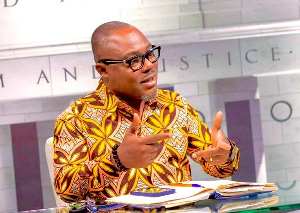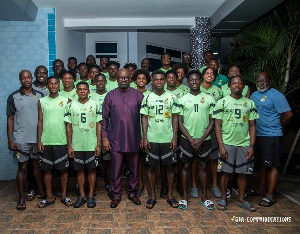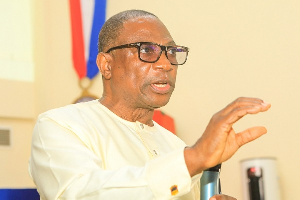All those in favour of purpose-driven education, its time to please step
up!!
I deem it necessary to step up to project the rather urgent need for a
change of attitude towards education in this country. Many people educated
in Ghana over the past half century have left Ghana to acquired additional
knowledge and expertise becoming giants in their fields of endeavour the
world over. Good example are Kofi Annan of the UN,
Dr. Peter Atadja of Novartis Pharmaceuticals, Dr. Ave Kludze of NASA and the
list goes on.These clearly answer the question on whether people of Ghanaian
origin and Africans for that matter are intellectually capable. Alot more
evidence continue to accumulate that totally disperse any contention that
Ghana and Africa own its current state of underdevelopment to lack of
creative thinking abilities.
*Purpose of education:*
The value of education to a human being resides in two important points,
firstly the transformation of the human mind from crude to structured or a
refined form and secondly the acquisition of the capability to transform
ones surroundings into a form that increases quality of life. It is in the
second point lies a clear demonstration of concept of purpose driven
education. The key question that anybody in the educational sector need to
always ask is "for what purpose is this quest for knowledge and
understanding? A quote from the Bible will explain what the purpose should
be for any society seeking enlightenment and training for its people. When
the time came for God to instruct the people of Israel to build the tent of
meeting and ark of the covenant, God said to Moses in Exodus 31:3 -"and I
have filled him with the Spirit of God, with skill, ability and knowledge in
all kinds of crafts". And in verse 6 of the same chapter it says "Also I
have given skill to all the craftsmen to make everything I have commanded
you". In this situation God choose to build the capacity of the workmen
involved in the project of constructing the tent of meeting and the ark of
the testimony by filling them with His Spirit. Society today builds the
capacity of its people through education and training for the many different
project necessary to build the structures and create the substance our lives
depend on.
Therefore, the delivery of educational services must be bench marked not by
the grades awarded but rather the various project targets in specialised
fields. Case in point is the training of automobile engineers in this
country. The fact that courses in automobile engineering is offered in the
Polytechnics and KNUST should reflect on the performance and longevity of
our cars. Any one who owns a car can concur with me, without subjecting this
issue to scientific polling and statistical analysis, that the current
situation strongly suggest that the level and scope of training in
automobile engineering is far lower that what is needed. I recently watch an
interview of a businessman whose cold store in Tema broke down so frequently
that he had to hire expertise from Holland at a great cost for revamping
equipment and training his personnel to better maintain their set up. What
he said clearly was that the Dutch expert had to be engaged again because
his person still could not manage the plant. This speaks volumes about
electrical engineering training in this country.
*Way forward:*
I was glad to note recently that KNUST was collaborating with GRATIS
Foundation for the practical assessment of students in the engineering
disciplines. This is one excellent way forward for rescuing the current
standards of education. Industry and end-users of educational products must
be involved in the evaluation of training programmes, with little emphasis
on grading of examinations but rather more on creative works. Those in the
visual and the performing arts will know exactly what I am talking about
because it is easier for these disciplines to escape the flaws of
paper-based examinations. And I will strongly advocate the use of creativity
as the basis of assessment
by teams of assessors to be made to form a larger proportions of the
educational grading systems.
*Stratification of Education at All Levels:*
The growth of any plant is well known to be dependent first on its root
system and therefore the way to fix the system of education to correctly
deal with the needs of society is to ensure that everybody is given a good
chance to express and develop the gift of God within them. The greatest
disincentive to any teacher is to be asked to handle a class of students
with vastly different intellectual abilities. In a typical class, the most
endowed students grasps what is being taught very quickly and are able to
ask the right questions, this is sharply contrasted by a group who require
several hours of teaching and will still fail. The danger is that the scope
of training is narrowed and endowed students are progressively retarded
whilst less endowed one are frustrated by the higher standard of assessment.
The way forward is the use of stratification of the student population at
all levels in addition to specialization based on the natural talent of a
people. I am of a strong conviction that a system that work well in Germany
and other developed countries could be adopted and adapted to rescue our
schools. The lower primary 1-3 could have all the kids together, upper
primary 4-6 could be separated into a 2-tier system and a 3 tier system for
JHS, SHS and the tertiary levels.
I fervently hope a major reorientation of the educational system will be
done soon begin the process of turning
the wheel of progress. Education is considered to be a fundamental human
right, but I favour the concept of education as therapy. Therapy is designed
to correct a misnomer, it is rare to find raw creative talent in the mould
of Bill Gates and Isaac Newton. The vast majority of people absolutely need
training to be become productive members of society,
implying that the "all manner of skills" needed for the national development
can only be obtained through training and education.
God bless our homeland.
--------------------------------------------
Patrick Kobina Arthur (PhD),
parthur14@gmail.com
Opinions of Saturday, 31 July 2010
Columnist: Arthur, Patrick Kobina














